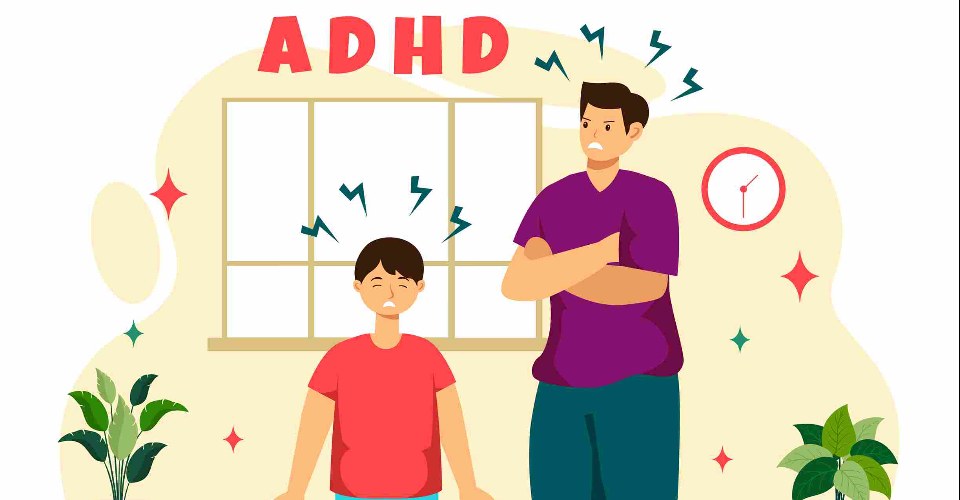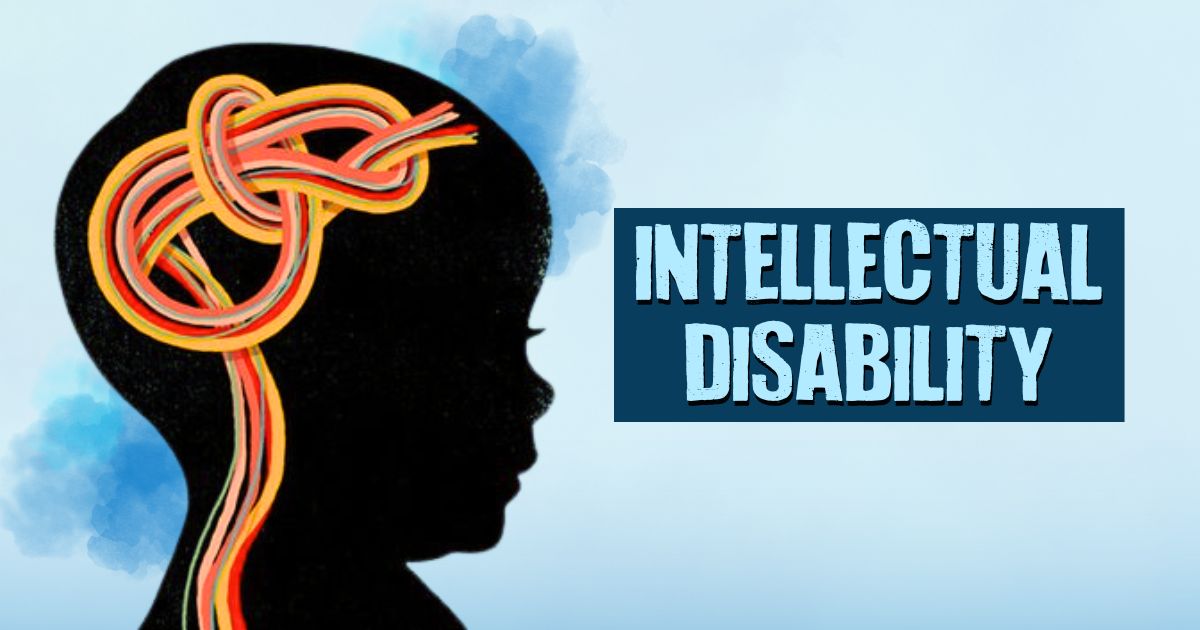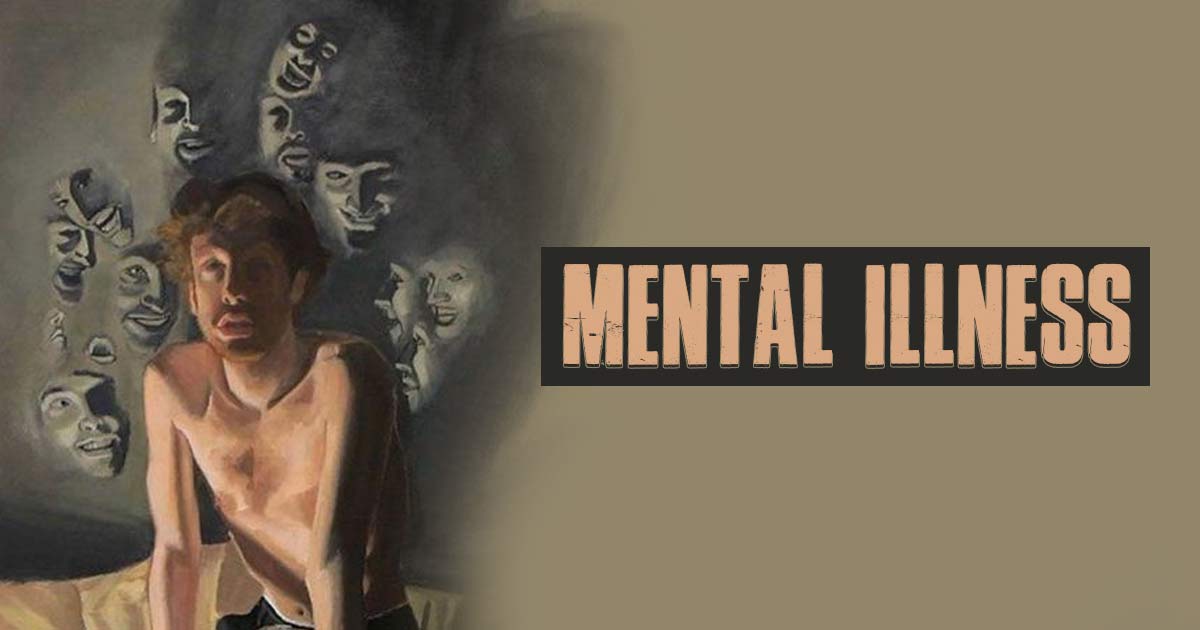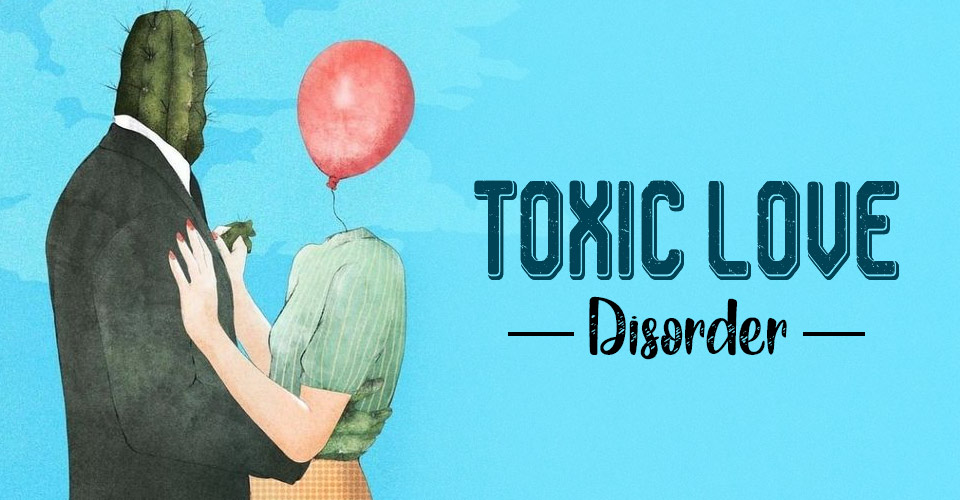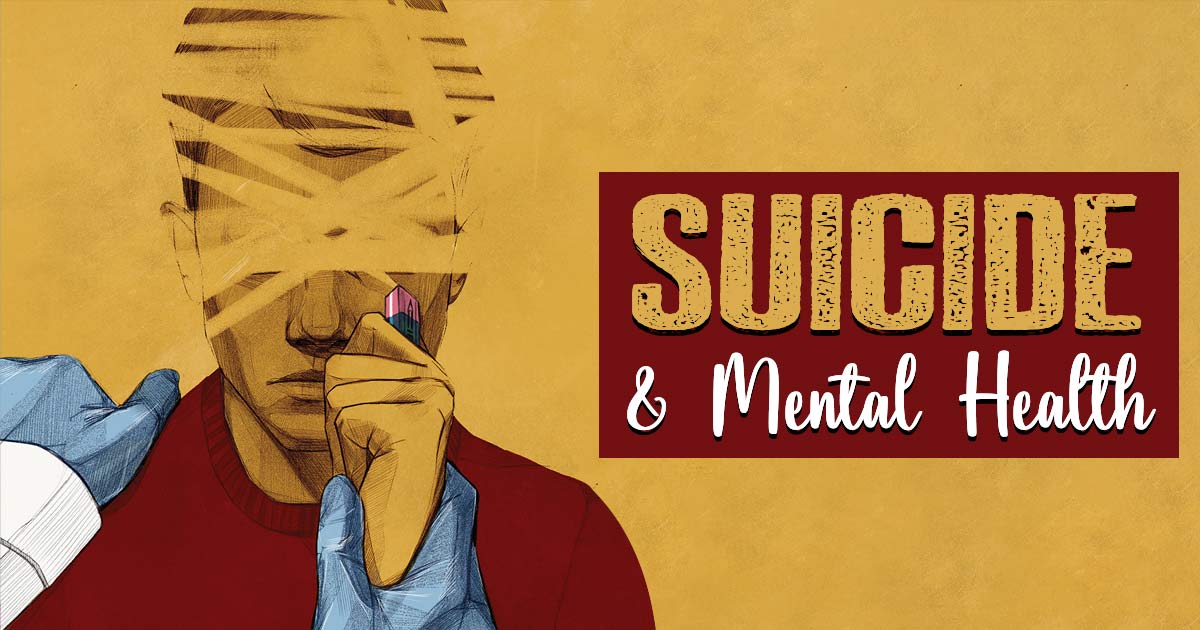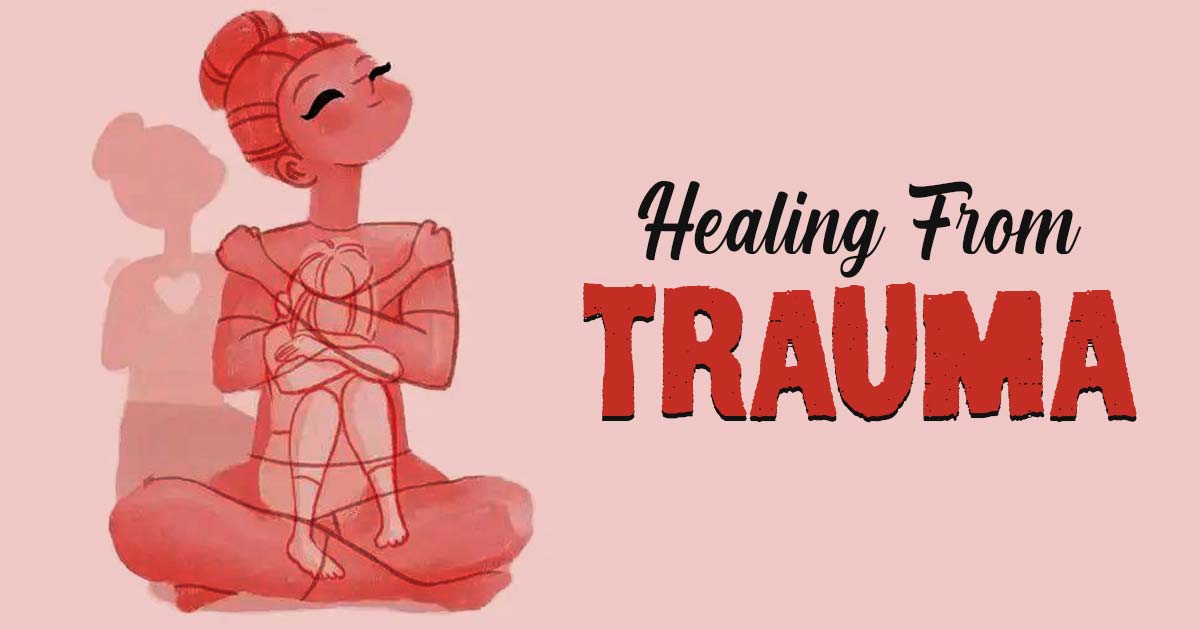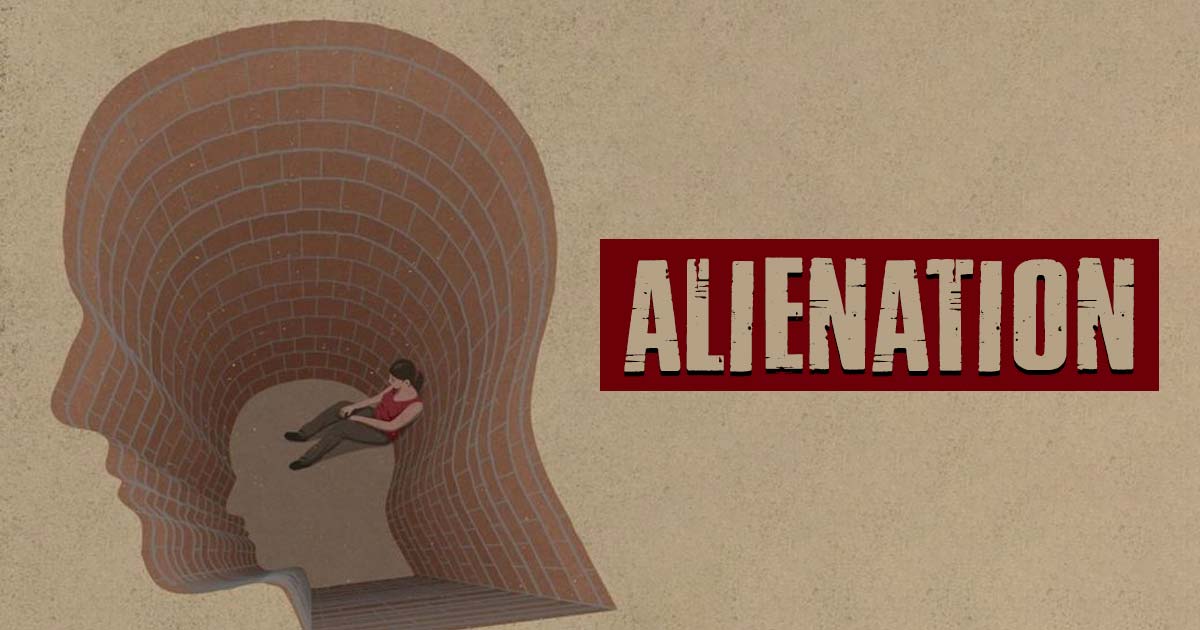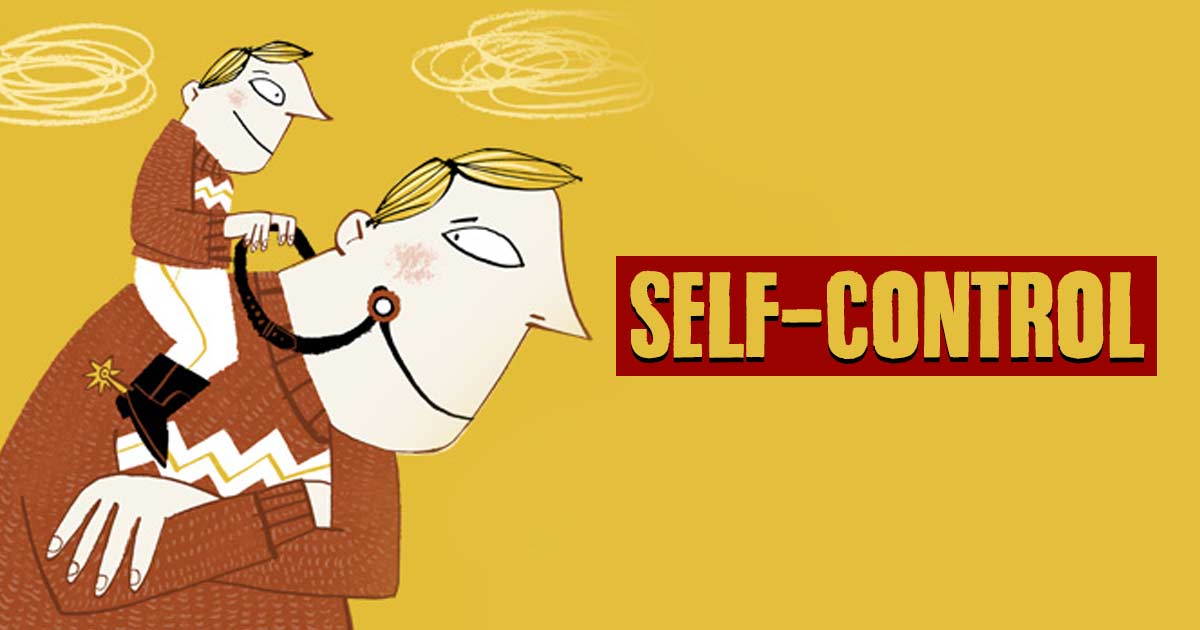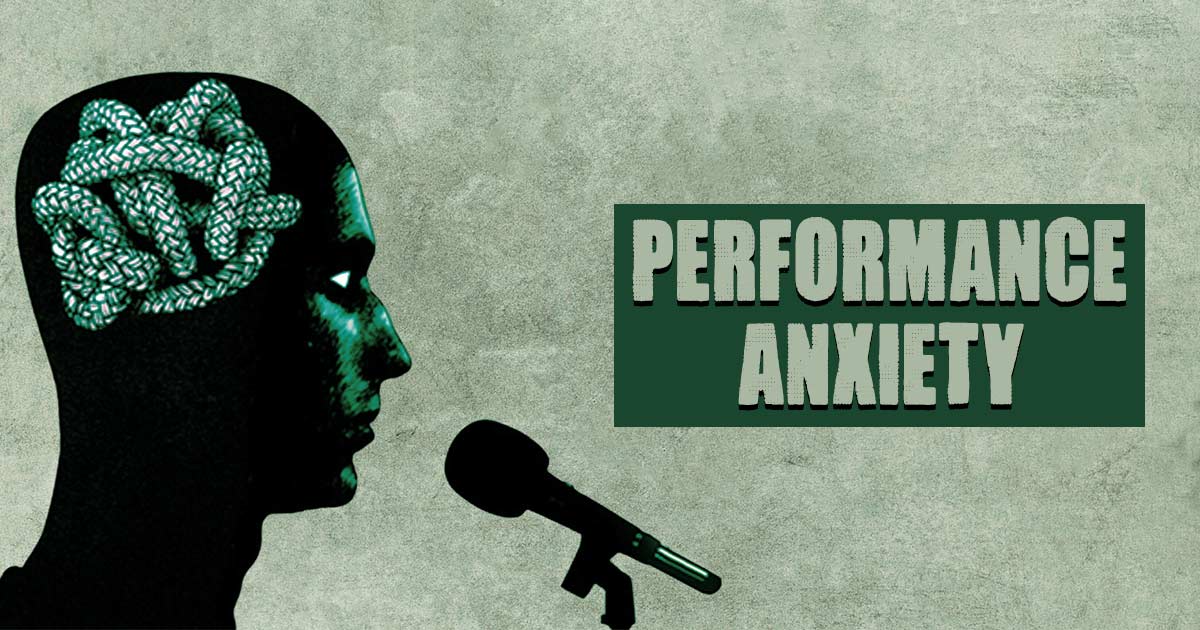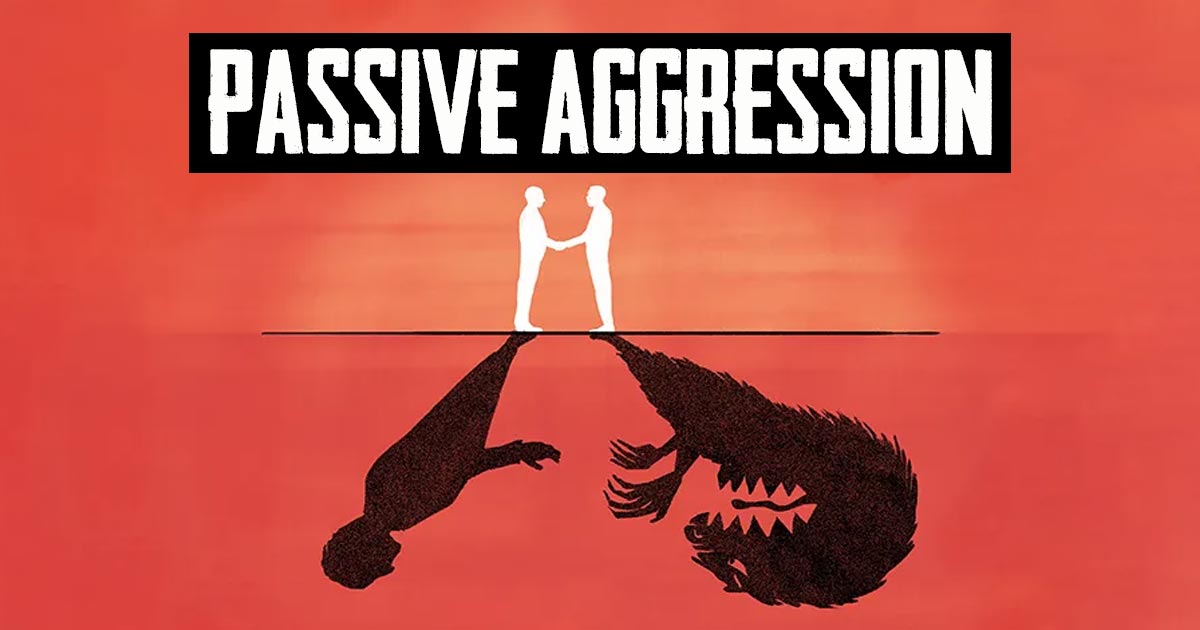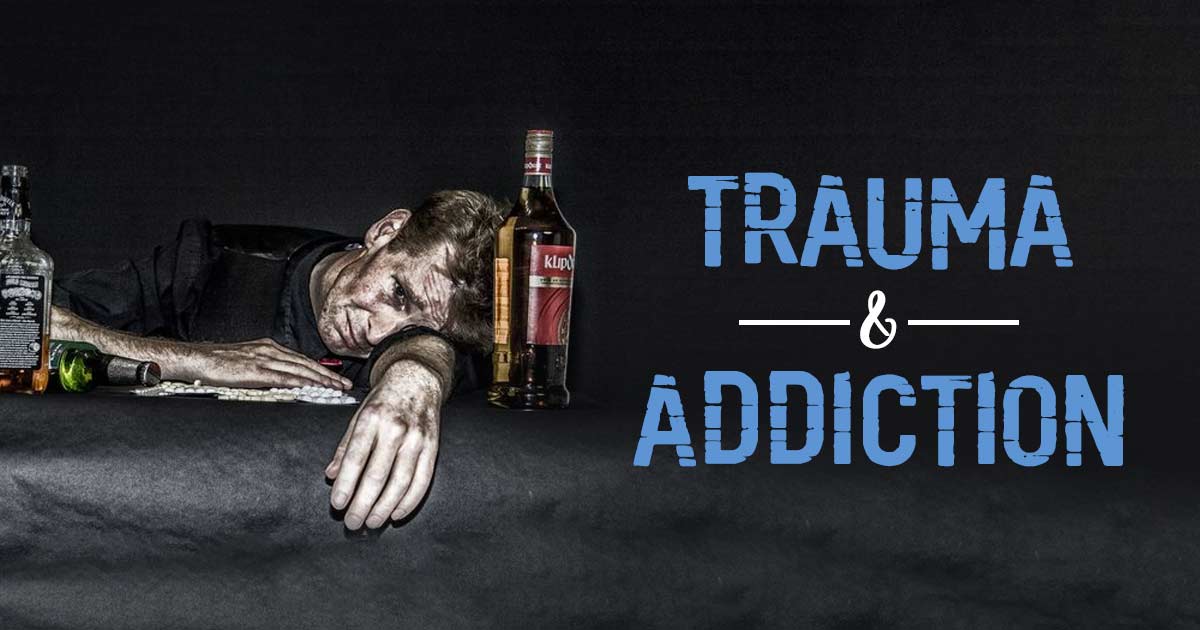Lying refers to making an untrue statement to deceive someone. It occurs when a person misleads or falsifies people intentionally.
What Is Lying?
Lying occurs when a person is untruthful, deceiving, or makes false statements. It is about a person making a deliberate choice to mislead others without giving prior information of that intention. Telling lies is considered a form of social behavior and also an integral part of our day-to-day communication. Certain instances of dishonesty may not fit under the definition of a lie, while some instances do. An untrue statement is not a lie until it is intended to deceive.
When someone omits information with the intent to deceive, it can also be considered a lie. Meanwhile, technically correct languages with an intention to mislead people may also be viewed as a lie. Falsifying is about giving false information to others despite knowing it to be false. In specific instances, people not only lie for their personal gain but also for others’ benefit.
A lie is a way of deceiving someone verbally and is an important part of our behavioral response in communicating with others. There are three criteria that must be met for a lie to occur –
- The first criterion is that a statement must be made. People can make statements either verbally or through any other system in which they can transmit signals and convey meaning.
- The second criterion is that the statement must be false. When an individual provides information that is an inaccurate description of reality, it is considered a lie. But false information can also be provided when a person is simply confused about reality.
- The third one is that the person must have the intention to deceive others. The intention to deceive can typically be inferred, as people are not capable of peering into each other’s minds and understanding their true intention.
A 2015 research paper 1 Farisha A, Sakkeel K. (2015). Psychology of Lying. International Journal of Indian Psychology, 2 (2), DOI: 10.25215/0202.047, DIP: 18.01.047/20140202 suggests, “Lying can be explained by different psychological principles of psychodynamic theory, humanistic theory, and behavior theory.” This study explains that a person’s desire to lie arises from a specific human nature to avoid emotional pain and increase pleasure. The differences between falsifying or misleading someone largely depend on its severity, frequency, and the reasoning behind it. A lie of omission occurs when a person simply remains silent with a deceptive intention. The desire to mislead someone can take two different forms, including:
- A response to a short-term issue that needs little planning
- Long-term lying that requires proper planning
What Is Pathological Lying?
When a person starts to lie more frequently than others without any proper reason, it can be a matter of concern. A 2005 study explains that it can cause a psychological condition named pathological lying. Most pathological liars find it very difficult to control their habit of lying unnecessarily. Mostly, people can identify pathological liars as they often display visible insecurity and lack of confidence. It does not depend on how significant the lie is or the reason behind it. An unhealthy lie affects people’s ability to trust a person.
Lying is extremely common in social interactions among people. But pathological lying is not similar to the lies people tell in their daily life. If telling lies becomes a habit and negatively affects people’s lives, it can lead to pathological lying 2 Yang, Y., Raine, A., Narr, K. L., Lencz, T., LaCasse, L., Colletti, P., & Toga, A. W. (2007). Localisation of increased prefrontal white matter in pathological liars. The British journal of psychiatry : the journal of mental science, 190, 174–175. https://doi.org/10.1192/bjp.bp.106.025056 . People with this condition often find it extremely difficult to stop telling lies. A 2019 study 3 Grant, J. E., Paglia, H. A., & Chamberlain, S. R. (2019). The Phenomenology of Lying in Young Adults and Relationships with Personality and Cognition. The Psychiatric quarterly, 90(2), 361–369. https://doi.org/10.1007/s11126-018-9623-2 claims that it can also be one of the symptoms of various personality disorders, such as borderline personality disorder, narcissistic personality disorder, or antisocial personality disorder.
There are also some people who are habituated to lie but have no personality disorder. Pathological liars tell lies compulsively without any proper cause. A 2005 research paper 4 Grubin D. (2005). Commentary: getting at the truth about pathological lying. The journal of the American Academy of Psychiatry and the Law, 33(3), 350–353. mentions, one of the key features to detect pathological lying is that these kinds of lies mostly involve no obvious motivation, but can affect others adversely. It makes socializing difficult and causes problems in maintaining interpersonal relationships.
Pathological lying is associated with several psychological disorders, such as:
1. Munchausen’s syndrome
Individuals with Munchausen’s syndrome 5 Prakash, J., Das, R. C., Srivastava, K., Patra, P., Khan, S. A., & Shashikumar, R. (2014). Munchausen syndrome: Playing sick or sick player. Industrial psychiatry journal, 23(1), 68–70. https://doi.org/10.4103/0972-6748.144975 may often indulge in uncontrollable, pathological lying regarding their medical history or symptoms only to increase the curiosity of the listener.
2. Depression
Studies 6 Thom, R., Teslyar, P., & Friedman, R. (2017). Pseudologia Fantastica in the Emergency Department: A Case Report and Review of the Literature. Case reports in psychiatry, 2017, 8961256. https://doi.org/10.1155/2017/8961256 have shown that pathological liars may experience certain symptoms of depression and anxiety.
Read More About Major Depressive Disorder ( Depression ) Here
3. Borderline personality disorder (BPD)
As people with BPD 7 Dike, C. C., Baranoski, M., & Griffith, E. H. (2005). Pathological Lying Revisited. CiteSeerX. https://citeseerx.ist.psu.edu/viewdoc/download?doi=10.1.1.833.4997&rep=rep1&type=pdf experience incredibly intense emotions, such as shame and guilt, and are more likely to be impulsive, they tend to tell lies more frequently to avoid several overwhelming situations.
4. Narcissistic personality disorder (NPD)
Research 8 Elaad, E., Hanania, S. B., Mazor, S., & Zvi, L. (2020). The relations between deception, narcissism and self-assessed lie- and truth-related abilities. Psychiatry, psychology, and law : an interdisciplinary journal of the Australian and New Zealand Association of Psychiatry, Psychology and Law, 27(5), 880–893. https://doi.org/10.1080/13218719.2020.1751328 says that the exaggerated sense of self-importance in people with NPD can be manifested in boastful lies about their social connection, career, and personal achievements.
Read More About Narcissism Here
5. Antisocial personality disorder (APD)
People with this personality disorder 9 Fisher KA, Hany M. Antisocial Personality Disorder. [Updated 2021 May 21]. In: StatPearls [Internet]. Treasure Island (FL): StatPearls Publishing; 2021 Jan-. Available from: https://www.ncbi.nlm.nih.gov/books/NBK546673/ often tell lies to gain status or to manipulate others.
Understanding Lying
People lie for various reasons, such as to avoid trouble and escape from responsibilities. They usually fear the possible consequences or threats occurring when the truth is revealed. That’s why they try to find solutions in the form of lies. Research 10 Williams, E. J., Bott, L. A., Patrick, J., & Lewis, M. B. (2013). Telling lies: the irrepressible truth?. PloS one, 8(4), e60713. https://doi.org/10.1371/journal.pone.0060713 says that 40% of young adults have reported telling lies at least once or twice per day. According to hedonistic nature 11 Taquet, M., Quoidbach, J., de Montjoye, Y. A., Desseilles, M., & Gross, J. J. (2016). Hedonism and the choice of everyday activities. Proceedings of the National Academy of Sciences of the United States of America, 113(35), 9769–9773. https://doi.org/10.1073/pnas.1519998113 , people are concerned with maximizing their mood when they feel very bad or very good about something. Hedonistic nature allows an individual to undertake less pleasurable yet necessary activities when he/she is in a more neutrally effective state. It refers to the view that all human action is influenced by desires for pleasure and the avoidance of pain.
The psychology of lying is an extremely complex concept. The cause behind someone’s lie is associated with what induces the person not to tell the truth. Some people lie to avoid punishment, while others may lie to avoid hurting someone’s feelings. There are some people who tell lies only out of their impulse. The reason behind a lie can be related to an issue of survival also.
A 2017 research paper 12 Polage D. (2017). The Effect of Telling Lies on Belief in the Truth. Europe’s journal of psychology, 13(4), 633–644. https://doi.org/10.5964/ejop.v13i4.1422 suggests that a liar’s mindset and attitude is interlinked with several negative consequences that include:
- Lying, as a form of deception, often diminishes trust between people.
- It can have adverse effects on people’s psychological well-being.
- Repeated lies can be a sign of an underlying personality disorder.
- It treats the people who are lied to as a means of achieving the liar’s purpose.
- It makes people take their decision based on false information.
- It can become a habit and can indulge one into several wrong-doings.
Regardless of the cause, it is a very unpleasant feeling to find out that someone has lied to us. One should learn how they can detect when someone is lying. If a person becomes habituated to tell lies more frequently, people should support him/her to get proper treatment for any underlying psychological condition.
Why People Lie
Lying allows people to gain a perceived control over the situation by using manipulation. It works as a defense mechanism that prevents people from being vulnerable and not revealing their true selves to others. When a person lies and gets rejected by others, there is a proper reason for him/her being rejected. Meanwhile, when an individual reveals the truth but gets rejected, they might think that they are fundamentally disliked which can negatively affect their self-esteem.
The habit of falsifying can also be an outcome of people’s past experiences. People who had an abusive childhood are more likely to create a world of their own. They tend to imagine more and lie for their own pleasure and happiness. The concept of lying is mostly used by people in order to avoid difficult situations as well as not to face certain emotions, including guilt, shame, depression, sadness, anxiety.
People with low self-confidence find it extremely difficult to deal with these feelings. Telling lies helps these people to avoid such situations in which they would have to deal with these overwhelming emotions. Another common reason for telling lies is the fear of hurting someone’s feelings. Some people fear dealing with the feelings that come with disappointing others.
Signs Of Lying
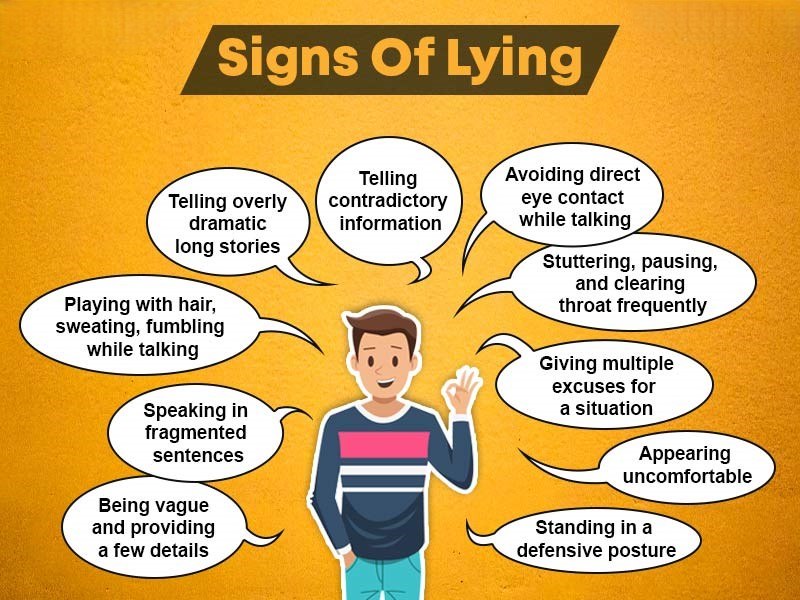
There is no such specific method to identify whether someone is telling lies or not. One needs to pay close attention to that person particularly. There are some signs through which one can detect liars.
- While telling lies, a person must unintentionally show one of the following signs:
- Being vague and providing a few details
- Speaking in fragmented sentences
- Failing to provide specific details when challenged
- Playing with hair, sweating, fumbling, or pressing fingers to lips while talking
- Repeating questions before answering them
- Explaining unverifiable details or telling overly dramatic long stories
- Telling contradictory information
- Unnecessarily staying calm and reacting poorly to anger aimed at them
- Avoiding direct eye contact while talking
- Stuttering, pausing, and clearing throat frequently
- Changing their voice or tone of talking
- Giving multiple excuses for a situation
- While denying something, making a slip of the tongue
- Appearing uncomfortable
- Standing in a defensive posture
Types Of Lying
There are five primary types of lying that includes:
- Falsifying refers to presenting false information as if it is true.
- Concealing is about not providing or withholding some information despite knowing it.
- Half-concealment refers to providing some parts of the truth but not saying anything untrue.
- Misdirecting is about acknowledging an emotion but misidentifying the cause.
- Incorrect-inference dodge refers to admitting the truth but in a way that implies the opposite of what is admitted.
Besides these five primary types, the concept of lies can be divided into four different colors, such as:
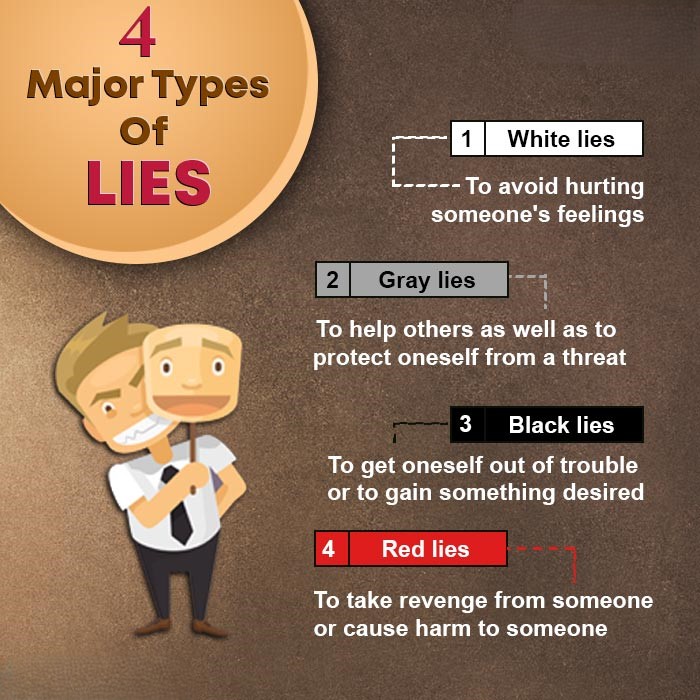
1. White lies
A 2020 study 13 Shali, M., Joolaee, S., Navab, E., Esmaeili, M., & Nikbakht Nasrabadi, A. (2020). White lies in pediatric care: a qualitative study from nurses’ perspective. Journal of medical ethics and history of medicine, 13, 16. https://doi.org/10.18502/jmehm.v13i16.4414 explains that, when a person tells lies occasionally to avoid hurting someone else’s feelings or uncomfortable social situations, these lies are usually known as white lies because they are not intended to harm someone. While lies mostly consist of exaggeration of the truth or partially false information.
2. Gray lies
Most of the lies people tell in daily life are gray lies. Studies 14 Bryant, E. M. (2008). Real Lies, White Lies and Gr Real Lies, White Lies and Gray Lies: T y Lies: Towards a Typology of ypology of Deception. CORE – Aggregating the world’s open access research papers. https://core.ac.uk/download/pdf/216387603.pdf have shown that these kinds of lies are mostly intended to help others as well as protect oneself from a threat. These lies are very complicated to clarify and often tend to be about serious or self-serving matters. These are less likely to be socially acceptable than white lies.
3. Black lies
Black lies involve simple and callous selfishness. People tell these types of lies either to get themselves out of trouble or to gain something they desire. These are often considered harmful to others.
4. Red lies
According to 2015 research 15 Warneken, F., & Orlins, E. (2015). The colour spectrum of lies. British Journal of Developmental Psychology, 33(3), 274-276. https://doi.org/10.1111/bjdp.12109 , these lies are more about revenge and spite. When people lie for malicious reasons and the lies involve serious consequences for others, these lies are known as red lies. Such lies often lead to several unfair situations. Red lies are considered the ‘real lies’ and completely socially unacceptable.
Avoid Unnecessary Lying
Lying is a very common part of our behavioral responses in everyday communication. People lie for various reasons, either for their own good or to avoid hurting someone’s feelings. A lie can also be used in the most negative manner, such as for taking revenge or causing harm to someone. Telling lies is not always about providing untrue information. If a person doesn’t give enough information that he/she has or provide half of the truth, it is also considered a lie.
Most people tell lies as a defense mechanism to avoid certain overwhelming emotions, such as shame, guilt, or disappointment. When a person’s habit of misleading others negatively affects their own or other’s well-being, it can be a matter of an underlying psychological condition. If you detect that one of your loved ones is becoming habituated to lying, encourage them to seek treatment.
Lying At A Glance
- Lying is about intentionally providing false or untrue information to deceive someone.
- People lie for different reasons, such as to avoid hurting someone, to escape from responsibilities, not to deal with the possible consequences etc.
- Lies can be categorized according to a color spectrum, including white, grey, black, and red lies.
- People tell lies in various ways, including falsifying, concealing, providing half-concealment, misdirecting, and creating incorrect-inference dodge.
- Pathological lying is a psychological condition in which people become habituated to tell lies more frequently without any proper reason.
- Pathological lying may be a sign of an underlying psychological condition, such as personality disorders.


